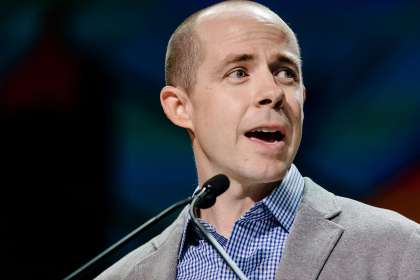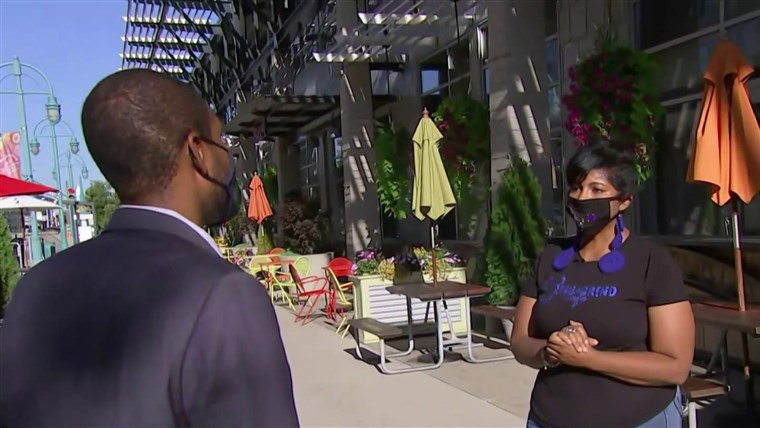Advertisement
Deeply conservative, they organize online and outside the Republican Party apparatus, engaging in more explicit versions of the chest-beating seen at the president’s rallies.

GOLDEN VALLEY, Ariz. — Great American Pizza & Subs, on a highway about 100 miles southeast of Las Vegas, was busier and Trumpier than usual. On any given day it serves “M.A.G.A. Subs” and “Liberty Bell Lasagna.” The “Second Amendment” pizza comes “loaded” with pepperoni and sausage. The dining room is covered in regalia praising President Trump.
But this October morning was “Trumpstock,” a small festival celebrating the president. The speakers included the local Republican congressman, Paul Gosar, and lesser-known conservative personalities. There was a fringe 2020 Senate candidate in Arizona who ran a website that published sexually explicit photos of women without their consent; a pro-Trump rapper whose lyrics include a racist slur aimed at Barack Obama; and a North Carolina activist who once said of Muslims, “I will kill every one of them before they get to me.”
All were welcome, except liberals.
“They label us white nationalists, or white supremacists,” volunteered Guy Taiho Decker, who drove from California to attend the event. A right-wing protester, he has previously been arrested on charges of making terrorist threats.
“There’s no such thing as a white supremacist, just like there’s no such thing as a unicorn,” Mr. Decker said. “We’re patriots.”
As Mr. Trump’s bid for re-election shifts into higher gear, his campaign hopes to recapture voters who drifted away from the party in 2018 and 2019: independents who embraced moderate Democratic candidates, suburban women tired of Mr. Trump’s personal conduct and working-class voters who haven’t benefited from his economic policies.
But if any group remains singularly loyal to Mr. Trump, it is the small but impassioned number of white voters on the far right, often in rural communities like Golden Valley, who extol him as a cultural champion reclaiming the country from undeserving outsiders.
These voters don’t passively tolerate Mr. Trump’s “build a wall” message or his ban on travel from predominantly Muslim countries — they’re what motivates them. They see themselves in his fear-based identity politics, bolstered by conspiratorial rhetoric about caravans of immigrants and Democratic “coups.”
The president draws support from a broader political and ideological cross-section of Republicans than the Trumpstock crowd reflected, and he attracts some independents and Democrats as well. The festival itself was relatively small, drawing about 100 people, though significant enough to attract the likes of Mr. Gosar.
But events like it, as well as speaking engagements featuring far-right supporters of the president, have become part of the political landscape during the Trump era. Islamophobic taunts can be heard at his rallies. Hate speech and conspiracy theories are staples of some far-right websites. If Trumpstock was modest in size, it stood out as a sign of extremist public support for a sitting president.
And these supporters have electoral muscle in key areas: Mr. Trump outperformed Mitt Romney, the 2012 Republican nominee, in rural parts of Arizona like Mohave County, where Golden Valley is located. Mr. Trump won 58,282 votes in the county, compared to 47,901 for Mr. Romney, though Mr. Romney carried the state by a much bigger vote margin.
Arizona will be a key battleground state in 2020: Democrats already flipped a Senate seat and a Tucson-based congressional district from red to blue in 2018. For Mr. Trump, big turnout from white voters in areas like Mohave County — and in rural parts of other battlegrounds like Florida, Michigan, Minnesota and Georgia — could be a lifeline in a tight election.
“We like to call this the ‘Red Wall of Arizona,’” said Laurence Schiff, a psychiatrist and Republican campaign official in Mohave County who organizes in support of Mr. Trump’s campaign. “Winning the state starts here, with us.”
Grass-roots gatherings play a critical role in the modern culture of political organizing, firing up ardent supporters and cementing new ones. Small circles of Trump-supporting conservatives, often organized online and outside the traditional Republican Party apparatus, engage in more decentralized — and explicit — versions of the chest-beating that happens at Mr. Trump’s closely watched political rallies.
In interviews, people in the crowd described a white America under threat as racial minorities typified by Mr. Obama, the country’s first black president, gain political power. They described Mr. Trump as an inspirational figure who is undoing Mr. Obama’s legacy and beating back the perceived threat of Muslim and Latino immigrants, whom they denounced in prejudiced terms.
“I don’t have a problem with Muslims,” said Angus Smith, an Arizona resident who attended the festival, “but can they take the rag off their head out of respect for our country?”
At Mr. Trump’s official rallies, including a recent one in Florida, the president has referred to Mr. Obama by stressing his middle name, Hussein, and said Democrats were “trying to stop me because I’m fighting for you.”
The Trumpstock speakers pushed even further, tying Mr. Obama’s middle name to a false belief that he is a foreign-born Muslim.
And Democrats were portrayed as not just political opponents, but avatars of doom for Mr. Trump’s predominantly white voter base and for the country.
“There is no difference between the democratic socialists and the National Socialists,” said Evan Sayet, a conservative writer who spoke at the event, referencing Nazi Germany. Democrats, he said, “are the heirs to Adolf Hitler.”
Speakers at Trumpstock said their cultural fears had been exacerbated by their state’s own changing nature: Arizona is on the front lines of undocumented border crossings from Mexico and racial minorities are expected to outnumber white people in the state in the next decade.
Arizona Democrats made political gains in 2018, and the national party is riding high after it won governor’s races this year in Kentucky and Louisiana. But Republicans remain bullish. They argue that a slice of their electoral base will only vote when the president is on the ballot, and point to regions like Northern Arizona as places to find, as Mr. Trump wrote in a recent tweet, “the Angry Majority.”
“We have the greatest base in the history of politics,” he said at a recent rally in Florida.
In Arizona, the most prominent pro-Trump, anti-immigrant groups are AZ Patriots and Patriot Movement AZ, which have held tight to the themes of white nationalism that some Republicans have denounced. In September, after repeated clashes, some members of the groups agreed to a court order to stop harassing migrants and church volunteers who help them.
Earlier this year, the groups and their allies organized a “Patriotism over Socialism” event in Gilbert, Ariz., near Phoenix, that included speeches from Representative Andy Biggs, the area’s congressman, and Kelli Ward, the state’s Republican Party chair. They appeared alongside more fringe figures: Sharon Slater of Family Watch International, which has promoted figures associated with anti-L.G.B.T. conversion therapy, and Laura Loomer, the far-right activist and Arizona native who was banned by Twitter and some other platforms after making anti-Muslim comments.
This blend of insider and outsider, of mainstream and conspiracy, is a feature of how Mr. Trump has reshaped the Republican Party in his image, and the core of his presidential origin story. Before Mr. Trump announced any firm plans to seek office, he was the national face of the “birther” conspiracy, which thrived in the Tea Party movement and had a significant amount of support from the Republican base, polls showed.
Stacey Goodman, a former police officer from New York who retired to Arizona and attended Trumpstock, said her distrust of Mr. Obama’s birth certificate had led her to Mr. Trump.
“If you’re Muslim, just tell us you’re Muslim,” she said of Mr. Obama. “It’s not that I didn’t believe him, I’m just not qualified to answer that question. I’ve seen information on both sides that’s compelling.”
Mona Fishman, a singer from the Las Vegas area who performed at the event, has written Trump-themed songs with titles like “Fake News” and “Smells like Soros,” which accuses liberal megadonor George Soros of running a shadow government, a trope widely condemned as anti-Semitic.
In the White House, Mr. Trump has relied on similar unfounded conspiracy theories and promoted people who have perpetuated them. He pardoned Joseph M. Arpaio, the former sheriff of Maricopa County, a hero of Arizona’s right wing and a leader of the “birther” movement, who was convicted of criminal contempt related to his aggressive efforts to detain undocumented immigrants.
On Mr. Trump’s Twitter account, likely the most watched in the world, he has promoted white nationalists, anti-Muslim bigots, and believers in the QAnon conspiracy theory, which claims that top Democrats are worshiping the Devil and engaging in child sex trafficking.
Even mainstream conservative media figures have embraced QAnon as a way to dismiss Mr. Trump’s political enemies. The Fox News host Jesse Watters, during a recent segment dedicated to the conspiracy, linked it to Mr. Trump’s Washington enemies. “Isn’t it also about the Trump fight with the deep state in terms of the illegal surveillance of the campaign, the inside hit jobs that he’s sustained?” he asked.
The embrace of conspiracy theories has frustrated some establishment Republicans and moderate Republican voters, who urge Mr. Trump to embrace a more traditional communication style.
His base disagrees.
“Please never stop tweeting,” Ms. Fishman sings in one of her songs, titled “Thank You President Trump.” “I can hardly wait to see what I’ll be reading.”
Events like Trumpstock are not limited to Arizona. Its organizer, Laurie Bezick, recruited speakers from around the country through social media, tapping into a network of pro-Trump voices only a click away.
Long-shot congressional candidates touting an “America First” agenda came from places like Iowa and Maryland. Leaders of fledgling political groups with names like JEXIT: Jews Exit The Democratic Party, Latinos for Trump and Deplorable Pride, a right-wing L.G.B.T. organization, told the overwhelmingly white audience they were not anti-Semitic, anti-immigrant, homophobic or racist. In fact, the speakers insisted, people who used those terms were more guilty of bigotry than the people they accused.
To applause, the co-founder of Latinos for Trump, Marco Gutierrez, read the pledge he took when he became a naturalized citizen and renounced his Mexican homeland. Nitemare, a pro-Trump rapper who refused to give his legal name, invoked QAnon and called Mr. Obama a racist slur in his set.
Brian Talbert, the founder of Deplorable Pride, was contacted by the White House after he was barred from the L.G.B.T. pride parade in Charlotte, N.C. At Trumpstock, Mr. Talbert, who has a history of expressing anti-Muslim beliefs on social media, gave voice to hatred of Mr. Obama and Hillary Clinton, the former secretary of state and Mr. Trump’s 2016 opponent.
“I think she should be hanging at the end of a rope for treason,” he said of Mrs. Clinton.
Members of groups like these at once make up a critical portion of Arizona’s conservative base, and espouse derogatory rhetoric that must repeatedly be repudiated, creating political difficulties for the state’s Republican lawmakers. After a photograph emerged last April of members of Patriot Movement AZ posing with Gov. Doug Ducey, he said he had never heard of the group. “I absolutely denounce their behavior,” he added.
Trumpstock attendees say they are used to being denounced, another quality they feel they share with the president. It’s part of why they are protective of him, to the point that they refuse to acknowledge the possibility of a Trump loss in 2020.
Mark Villalta said he had been stockpiling firearms, in case Mr. Trump’s re-election is not successful.
“Nothing less than a civil war would happen,” Mr. Villalta said, his right hand reaching for a holstered handgun. “I don’t believe in violence, but I’ll do what I got to do.”



